"B.T.C. Must be Firm with Executives"
Page 31
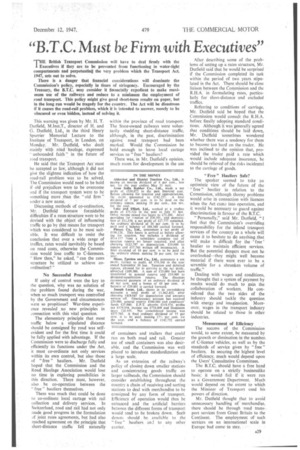
Page 32
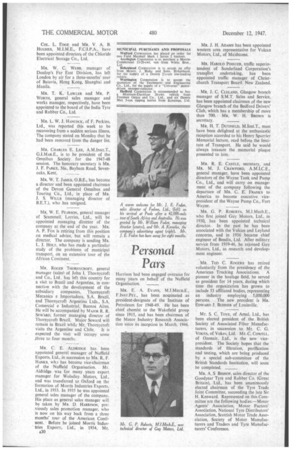
Page 33
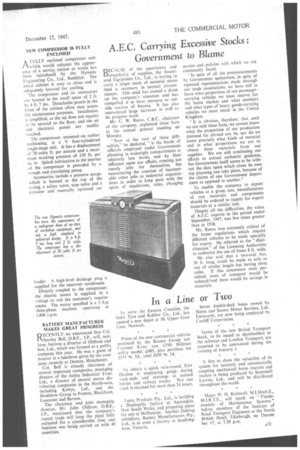
Page 34
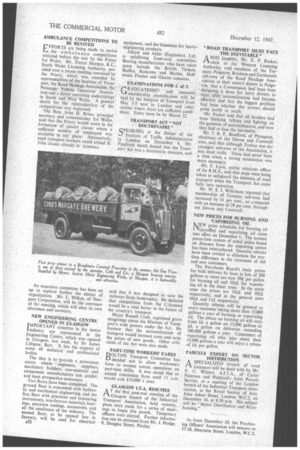
Page 35
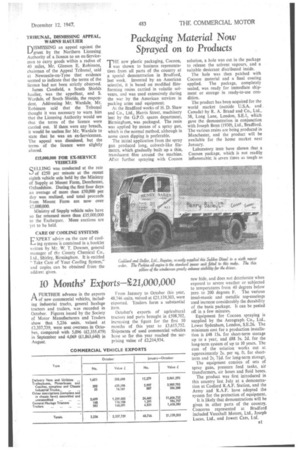
If you've noticed an error in this article please click here to report it so we can fix it.
THE British Transport Commission will have to deal firmly with the I. Executives if they are to be prevented from functioning in water-tight compartments and perpetuating the very problem which the Transport Act, 1947, sets out to solve.
There is a danger that financial considerations will dominate the Commission's policy, especially in times of stringency. Encouraged by the Treasury, the B.T.C. may consider it financially expedient to make maximum use of the raihvays and reduce to a minimum the employment of road transport. This policy might give good short-term results on paper, but in the long run would be tragedy for the country. The Act will be disastrous if it causes the road-rail problem, which it is intended to answer, merely to be obscured or even hidden, instead of solving it.
This warning was given by Mr. H. T. Duffield, M.Inst.T., director of H. and G. Duffield, Ltd., in the third Henry Spurrier Memorial Lecture to the Institute of Transport, in London, on Monday; " Mr. Duffield, who dealt mainly With road haulage, expressed " unbounded faith" in the future of road transport.
He said that the Transport Act must be accepted as law, although it did not give the slightest indication of how the road-rail problem was to be solved. The Commission would need to be bold if old prejudices were to be overcome and if the transport system were to be something More than the "old firm under a new name.
Discussing methods of co-ordination, Mr. Dutfield foresaw formidable difficulties if a rates structure were to be devised with the object of influencing traffic to go by that means for tranSporf which was considered to be most suit able. It was difficult to resist the conclusion that over a wide range of traffics, rates would inevitably be based on road costs,. otherwise the Commission would lose traffic to C-licensees.
"How then," he asked, "can the rates structure be utilized to achieve coordination?"
No Successful Precedent If unity of control were the key to the question; why was no solution of the problem found during the war, when so much transport was controlled by the Government and circumstances were so propitious? War-time experience revealed no new principles in connection with this vital question.
The elementary principle that most raffle below a stipulated distance should he consigned by road was selfevident and for the first time it could be fully applied with advantage. If the Commission were to discharge fully and efficiently its functions under the Act, it must co-ordinate not only services within its own control, but also those
of" free " hauliers. Mr. Dutfield hoped• that the Commission and the Road Haulage Association would lose no time in exploring possibilities in this direction, There must, however, also be co-operation between the " free" hauliers themselves. , There was much that could be done to co-ordinate local cartage with rail collection and delivery services. In Switzerland, road and rail had not only made good progress in the formulation of joint rates agreements, but had also reached agreement on the principle that short-distance traffic fell naturally
within the province of road transport. The State-owned railways were voluntarily shedding short-distance traffic, although, in the past, discrimination against road transport had been marked. Would the Commission be bold enough to leave local cartage services to " free " hauliers?
There was; in Mr. Duffield's opinion. much room for development in the use
IN THE MONEY
Aldershot 'and District Titiction Co., Ltd.' is paying an interim dividend of 8 Per cent., less tax. fur the year ending May 31 next.
Avon India Rubber Co., Ltd.* made a net profit of 030,072 in the past financial year.
Before allowing for taxation and appropriations. the profit amounted to £342257. A final dividend of 7 per cent, is to he paid on the ordinary shares, making 10 per cent., less tax, for the year.
Take and Elliott. Ltd.. worked at a trading profit of £71,522 in the year to July 31 last. Other income raised this figure to £72,300. After Providing for rixation of £26,391, and depreciation of £11358. a net profit of £27,777 remained. An ordinary dividend cif 20 per cent, is to be Paid and a balance of £66,300 carried forward.
Plessey Co., Ltd„ announces a net mmtit of £190,126. This figure is arrived at before allowing for taxation, hut includes a dividend of £114 157 from a subsidiary company out of taxation reserve no longer rewired, and after charting £115,797 to depreciation, •£141,0011 to repairs and £17,745 written ore investments. A final dividend of 10 per cent, is to he paid on the ordinary shares, making 20 per cent, for the year, Mann, Egerton and Co., Ltd.. announces a net Profit, subject to audit, of £75.200 in the year ended September 30 last. Taxation and deferred repairs, allowed for in arriving at the net profit, absorbed £109,500. A sum of £25,000 has been transferred to general reserve and £10.000 to dividend-equalization reserve. The directors recommend payment of an ordinary dividend or 441 ner cent, and a bonus of 60 per cent. A balance of £29,001 in carried forward.
Joseph Lucas, Ltd., shows in its consolidated accourils a total Profit of £1,962,452, after charging £419,647 for depreciation and amounts written off, Obsolescence account has received E50.000. general T eser ve £100,000 and employees' Funds 025.0043. E.P.T. absorbs 019,574. profits tax £120,054. Income tax £774.009 and Dominion taxes £20,553. Net consolidated income was £377,705. A final ordinary dividend of 15 per • cent, is to be paid. making 17k4 per cent, for the year. and a balance or 0142,752 carried forward.
of containers and trailers that could run on both road and rail. Greater use of small containers was also desirable, and the Commission was well placed to introduce standardization on a large scale.
As art extension of the railway's policy of closing down smaller stations and conCentrating goods traffic on larger railheads, the Commission should consider establishing throughout the country a chain of receiving and sorting stations to deal with merchandise to be consigned by any form of transport. Efficiency of operation would thus be enhanced and the artificial barriers between the different forms of transport would tend to be broken down. Such depots should be available to the " free " 'hauliers an I to any other carrier.
After describing some of the problems of setting up a rates structure, Mr. Dutfield said that he would be surprised if the Commission completed its task within the period of two years stipulated in the Act. There should be close liaison between the Cominimion and the R.H.A. in formulating rates, particularly for short-distance and excluded traffics.
Referring to conditions of carriage, Mr. Duffield said he hoped that the Commission would consult the R.H.A. before finally adopting standard .Conditions: Although it was'generally agreed that conditions should be laid down, Mr. Duffield `sometimes wondered whether there was a tendency for them to become too hard on the trader. l-k was inclined to the opinion that, provided the trader paid a rate which would include adequate insurance, he should be relieved of the risks incidental to the carriage of goods.
"Free" Hauliers Safe?
The speaker seemed to take an Optimistic view of the future of the "
free" haulier in relation to the Commission, although thorny problems would arise in connection with licences when the Act cams into operation, and it would be necessary to guard against discrimination in favour of the B.T.C.
"Personally," said Mr. Duffield, " feel that the Commission's overriding responsibility for the inland transport services of the country as a whole will cause it to hesitate to do anything,that will Make it difficult for the 'free' haulier to maintain efficient services, But the potential dangers must not be overlooked—they might well become material if there. were ever to be a scramble for a shrunken volume of traffic."
Dealing with wages and conditions, he thought that a system of payment by results would do much to gain the collaboration of workers. He considered that the two sides of the industry should tackle the question with energy and imagination. Moreover, wages in the transport industry should be related to those in other industries.
Measurement of Efficiency The success of the Commission would, to some extent, be measured by the growth or diminution in the number. of C-licence vehicles, as well as by the standards of service given by " free " hauliers, In securing the highest level of efficiency, much would depend upon the Users' Consultative Committees.
The B.T.C. should have a free hand to operate on a strictly, businesslike basis; it would fail if it were run as a Government Department. Much would depend on the extent to which the Minister of Transport used his powers of direction.
Mr. Dutfield thought that to avoid unnecessary handling of merchandise, there 'should be through -road transportservices from Great-Britain to the Continent. The employment of such services on an international scale in Europe had come to stay. Cor. L. EDGE and MR. V. A. B. HUGHES, M.I.M.E., F.C.I.P.A., have been appointed directors of the Chloride Electrical Storage Co., Ltd.
• MR, W. C. WEBB, manager of Dunlop's Far East Division, has left London by air for a three-months' tour of Batavia, Hong Kong, Shanghai and Manila.
• MR. T. K. LAWLER and MR. P. Woart', general sales manager and works manager, respectively, have been appointed to the board of the India Tyre and Rubber Co., Ltd.
Ma. L. W. J. HANCOCK, of F. Perkins, Ltd., was reported this week to be recovering from a sudden serious illness. The company stated on Monday that he had been removed from the danger list.
MR. CHARLES E. LEE, A.M.INST.T., G.I.MAR.E., is to be president of the Omnibus Society for the 1947-48 session. The honorary secretary is MR. J. F. PARKE, 56a, Bayham Road, Sevenoaks, Kent.
MR. W. T. JAMES. 0.B.E., has become a director and been appointed chairman of the Devon General Omnibus and Touring Co., Ltd., in place of MR. J. S. NW's (managing director of B.E.T.), who has resigned.
MR, W. E. PEARSON, general manager of Scammell, Lorries, Ltd., will be appointed managing director of the company at the end of the year. MR. A. P. Fox is retiring from this position on medical advice, but will remain a director. The company is sending MR. L. J. HOLT, who has made a particular study of the problems of municipal transport, On an extensive tour of the African Continent.
M. ROGER THORNYCROFT, general manager (sales of John I. Thornycroft and Co., Ltd • has left this country for a visit to Brazil and Argentina, in connection with the development of the subsidiary companies. Thornycroft Mecanica e lmportadora, S.A. Brazil. and Thornycroft Argentina Ltda., S.A. Comercial e Industrial, Buenos Aires. He will be accompanied by MAJOR R. R. SEWARD, former managing director of Thornycroft Brazil. Major Seward will remain in Brazil whilc Mr. Thornycroft
visits the Argentine and Chile. it is expected the visit will occupy some .three to four month-,
• MR. C. E. AromooR has been appointed general manager of Nuffield Exports, Ltd., in succession to MR. R. F. HANKS, wha has become vice-chairman of the Nuffield Organisation. Mr. Aldridge was for many years export manager for Wolsoley Motors, Ltd., and was transferred to Oxford on the formation of Morris Industries Exports. Ltd., in 1933. In 1935 he was appointed general sales manager of the company. His place as general sales manager will be taken by MR. D. HARRISON, previously sales promotion manager, who is now on his way back from• a three months' tour of the American Continent. Before he joined Morris Industries Export, Ltd., in 1934, Mr.
A30 Harrison had been engaged overseas for many years on behalf of the Nuffield Organisation.
MR. E. A. EVAhIS, F.INST.PET., has been nominated as president-designate of the Institute of Petroleum for 1948-49, He has been chief chemist to the Wakefield group since 1915, and has been chairman of the Motor Industry Research Association since its inception in March, 1946. MR. J. H. ADAMS has been appointed western area representative for Vulcan Motors, Ltd., of Maidstone.
MR, HAROLD POINTER, traffic superintendent of Sunderland Corporation's transport undertaking, has been appointed traffic manager of Christchurch Transport Board New Zealand.
MR, J. C. CLELAND, Glasgow branch manager of S.M.T. Sales and Service, has been appointed chairman of the new Glasgow branch of the Bedford Drivers' Club, which has a membership of more than 700. MR, W. H. BROWN IS secretary.
MR. H. T. DUTFIELD, M.Inst.T., must have been delighted at the enthusiastic reception accorded to hi3 Henry Spurrier Memorial lecture, read before the Institute of Transport. He said he would always treasure the memorial plaque presented to him.
MR. R. E. CASTLE, secretary, and MR. M. J. CRAWFORD, A.M.I.C.E., general manager, have been appointed directors of the Wayne Tank and Pump Co., Ltd., and will carry on management of the company following the departure of MR. C. E. FRANKS to America to become executive vicepresident of the Wayne Pump Co., Fort Wayne.
MR. G. P. ROBERTS, M.I.Mech.E., who first joined Guy Motors, Ltd., in 1930, has been appointed technical director. In the past he has been associated with the Vulcan and Leyland concerns, and in 1936 became chief engineer of Bendix, Ltd. After military service from 1939-46, he rejoined Guy Motors, Ltd, as research and development engineer.
MR. TED C. ROGERS has retired voluntarily from the presidency of the
American Trucking Associations. A pioneer in the haulage field, he served as president for 14 years, during which time the organization has grown to include 53 affiliated bodies, representing an industry employing 5,000,000
persons. The new president is MR.
EDWARD J. BUTTNER of Louisville. • Mr. S. C. TOYE, of Amal, Ltd., has been elected president of the British Society of Associated Filter Manufacturers, in succession to Mr. C. G. VokRs, of Vokes. Ltd. Mr. C. CowErt„ of Ozonair. Ltd., is the new vicepresident. The Society hopes that the standards of filtration, purification and testing, which are being produced by a special sub-committee of the British Standards Institution, will soon
be completed.
MR. A. S BISHOP, sales director of the Goodyear Tyre and Rubber Co. (Great Britain), Ltd., has been unanimously elected chairman of the Tyre Trade Joint Committee, succeeding the late Sir H. Kenward. Represented on this Committee are the following bodies:—Motor Agents' Association, Motor Factors' Association, National Tyre Distributors' Association, Scottish Motor Trade Association, • Society of Motor Manufacturers and Traders and Tyre Manufacturers' Conference. NEW COMPRESSOR IS FULLY ENCLOSED 1-3A FULLY enclosed compressor unit
which would enhance the appearance of a service station or works has been introduced by the Hymatic Engineering Co., Ltd., Redditch. The metal cabinet is easy to clean: and is adequately louvred for cooling.
The compressor and ,its accessories a le housed in the small space of.2 ft. by 4 ft. 7 ins. Detachable panels in the front of the cabinet allow easy access For maintenance purposes. Installation is simplified, as the sect does not require to be secured to the floor, and the air :Ind electrical points are readily ;cached.
The compressor, mounted -on rubber cushioning, is a V four-cylindered• single-stage unit. It has a displacement of 20 cubic ft. per minute and a maximum working pressure Of 150 lb. per so. in. Splash lubrigation to the interior of the compressor is provided by a trough and circulating pump.
Accessories include a pressure gauge, which is located at the top of the casing, a safety valve, stop valve and a pressure and manually operated un
loader. A high-level drainage plug is supplied for the reservoir condensate.
Directly coupled to the compressor, theelectric motor is supplied at a voltage to suit the customer's requirements. The motor specified is a 5 h p. three-phase machine operating at 1.400 r.p.m.
BATTERY MANUFACTURER MAKES GREAT PROGRESS
RECENTLY we announced that Col. JAStanley Bell, 0.B.E., J.P., will, next June, become a director of Oldham and Son, Ltd., which was formed as a public company this year. He was a guest of honour at a luncheon given by the company recently at Denton, Manchester,
Col. Bell is already chairman of several important companies, managing director of the Astley Industrial Trust, Ltd., a director of several motor distributing companies in the North-west, including Kirbys, Ltd., and the Bradshaw Group in Preston, Blackburn, Lancaster and Barrow.
The chairman and joint managing director, Mr. John Oldham, 0.B.E., J.P., mentioned that the company's export trade will keep the plant fully occupied for a considerable time, and butiness was being carried on with 40 countries.: AMBULANCE COMPETITIONS TO BE REVIVED
EFFORTS are being made to revive 1—, the ambulance competitions initiated before the war by the Priory for Wales. Mr. Trevor Morgan, K.C., South Wales Licensing Authority, presided over a recent meeting convened by the Priory, which was attended• by representatives of the Institute of Trans7, port, the Road Hitaktge Association, the Phisenger yelricle Operators' Association and a dazen operating undertakings' in South and' West'Wales. A general ' desire for the reintroduction of the ' cornipetitions Was expressed.. -The Hon. JOhn K. Bruce, principal secretary and commissioner for Wales, said that the Priory would assist in the formation' of special classes where "a sufficient number of employees was available in anyplace. Alternatively, road transport workers could attend St: John class already in existence.
An executive committee has been set up to explore further the matter of organization. Mr. L. Wilkes, of Newport Corporation, will be the convenor of the meeting, which will elect its own chairman and secretary.
NEW ENGINEERING CENTRE OPENED IN GLASGOW
I MPORTANT concerns in the motor
industry are represented in the Engineering Centre, which was opened in Glasgow, last week, by Sir James Lithgow, Bart. It has the support of some 40 technical and professional bodies.
The idea is to provide a permanent centre where engineers, suppliers, machinery builders, raw-material and component manufacturers can exhibit, and meet prospective customers.
Two floors have been completed. The ground floor is concerned with hydraulic and mechanical engineering, and the first floor with precision and measuring instruments, non-ferrous materials, bearings, precision castings, accessories, and all the smallware of the industry. The second floor, to be opened late in January, will be used for electrical
A32 equipment, and the basement for heavyengineering products. Alford and Alder (Engineers), Ltd., is exhibiting front-axle assemblies. Bearing manufacturers who have taken space include the British Timken, Skefko, Ransome and Marles, Hoffmann, Fischer and Glacier concerns.
EXAMINATIONS FOR I. 'of T.
RAD UATESHIP and associate membership examinations will be held by the Institute of Transport from May 3-5 next in • London and other centres where there are sufficient candidates. Entry must be by March 22.
TRANSPORT ACT "NOT DOCTRINAIRE"
QPEAKING at the dinner of the
Institute of Traffic Administration in London on December 4, Mr. Frederick Smith denied that the TranspOrt Act was a doctrinaire measure, and said that it was designed to. save the railways from bankruptcy. He declared that competition from the C-licensee would be a vital factor in the future of the country's transport.
Major Russell Croft, expressed grave misgivings about the Minister of Transport's wide powers under the Act. He foresaw that the nationalization of transport would increase costs and raise the prices of new goods. Other criticisms of the Act were also made.
PART-TIME WORKERS' FARES
BOLTON Transport Committee has decided not to allow workmen's fares to women cotton operatives on part-time shifts. It was stated that to extend concession fares until 11 a.m. would cost £14,000 a year.
GLASGOW I.T.A. RESUMES
AT the first post-war meeting of the Glasgow branch of the Industrial Transport Association, held recently, plans were made for a series of meetings to begin this month, Temporary officers were elected. Further inform," tion can be obtained from Mr. J. Hodge, 9, Douglas Street, Paisley. "
"ROAD TRANSPORT MUST FACE THE INEVITABLE"
AMID laughter, Mr. E. F. Packer, clerk to the Western Licensing Authority, told members of the Torquay, Paigaton, Brixharn and Dartmouth sub-area of the Road Haulage Association, at their annual dinner at Paign`•tort,`that a Commission had been busy
• designing a dress for lorry drivers to -vti,ear. after nationalization had become effective and that the biggest problem had been whether the arrows should point north or south.
Mr. Packer said that all hauliers had been thinking talking and fighting on the question of nationaliiation, and now they haA to face the inevitable.
Mr. J. R. F. Bradford, of Plympton, chairman of the Devon and Cornwall area, said that although Torbay was the youngest sub-area of the Association, it was most virile. There had never been a time when a strong association was more necessary.
Mr. F. Lyon, public relations officer of the R.H.A., said that steps were being taken to safeguard the interests of road transport when the Transport Act came fully into operation.
Mr. W. S. J. Wilkinson reported that membership of Torquay sub-area had increased by 61 per cent., as compared with an increase of 28 per cent. throughout Devon and Cornwall.
NEW PRICES FOR BURNING AND VAPORIZING OIL
MEW price schedules for burning oil 11(paraffin) and vaporizing oil came into effect on December I. The normal peace-time system of zonal prices based on distance from the importing centre has been reintroduced. Quantity rebates have been revised to eliminate the wartime difference in the treatment of old and new customers.
The Petroleum Board's basic prices for bulk delivery by hose in lots of 200 gallons or more are now 10d. per gallon for burning oil and 101d, for vaporizing oil in the inner zone. In the outer zone the prices are 10/d. and ION. respectively, and in the general zone 10d. and 11d. respectively.
Quantity rebates will be granted to every customer taking more than 15,000 gallons a year of burning or vaporizing oil. The rebate on burning oil will vary from id. a gallon on 15,000 gallons to a gallon on deliveries exceeding 100,000 gallons a year. Consumers of vaporizing oil who take more than 15,000 gallons a year will enjoy a rebate of id. per gallon.
PARCELS EXPERT ON SECTOR DISTRIBUTION rtA SPECIALIZED branch of road transport will be dealt with by Mr. F. C. Wilmot, A.I.T.A., of Carter Paterson and Pickford's Joint Parcels Service, at a meeting of the London branch of the Industrial Transport Association, at the Royal Society of Arts, John Adam Street, London, W.C.2, on December 16, at 6.30 p.m. His subject will be "Sector Distribution and Warehousing."
As from December 20, the Purchasing Officers' Association will remove to 17-18, Henrietta Street, London, W.C.2.
TRIBUNAL, DISMISSING APPEAL, WARNS HAULIER
DESTMSSING an appeal against the L./grant by the Northern Licensing Authority of a licence to an ex-Serviceman to carry goods within a radius of 40 miles, Mr'. Gleeson E. Robinson, chairman of the Appeal Tribunal, said at Newcastle-on-Tyne that evidence seemed to indicate that the terms of the licence had not been strictly observed.
James Cansfield, a South Shields haulier, was the appellant, and S. Wardale, of South, Shields, the respondent. Addressing Mr. Wardale; Mr. Robinson said that the Tribunal thought it was necessary to warn him that the Licensing Authority would see that the terms of the licence were carried out. If there were any breach, it would he useless for Mr. Wardale to state that he was an ex-Serviceman. The appeal was dismissed, but the terms of the licence were slightly altered.
£15,000,000 FOR EX-SERVICE VEHICLES QELLING was conducted at the rate l•-) of £250 per minute at the. recent eighth vehicle sale held by the Ministry of Simply at Mount Farm, Dorchester,, Oxfordshire. During the first four days: an average of more than £50;000 goer day 3111351 realized, and: totali proceeds. from Mount Farm are now over £2,000,000.
Nfinistryof Supply vehicle' sales have so far returned more than £15,000,000 to the Exchequer. More auctions are yet to be held.
CARE OF COOLING' SYSTEMS XPERT advice on the care of cool ing systems is contained in a booklet written by Mr. W. T. Downes, general manager of the County Chemical' Co., Ltd., Shirley, Birmingham. It is entitled "Take Care of Your Cooling System,"' arid copies can be obtained from the address given.




















































































